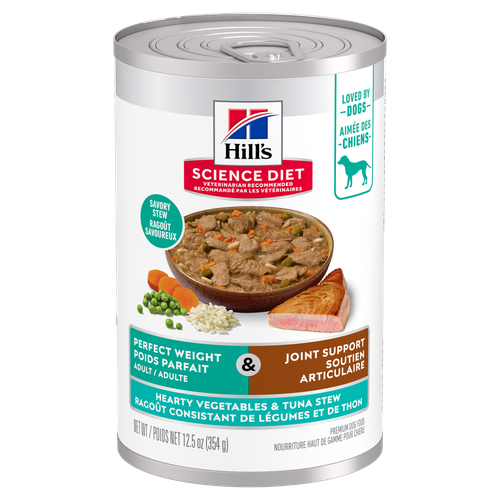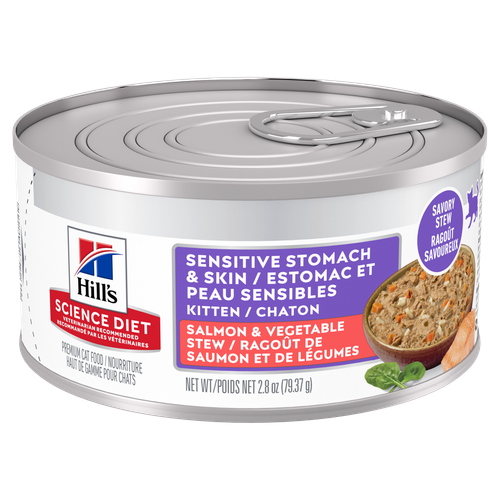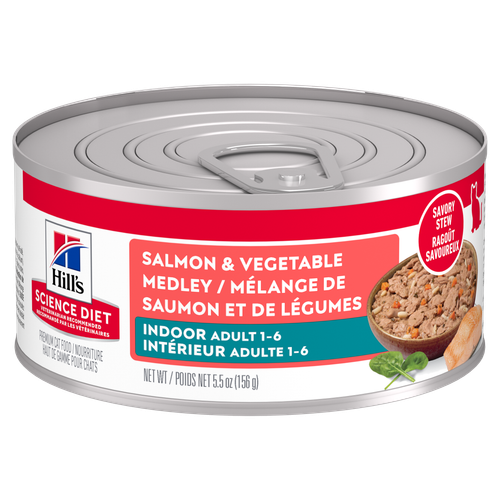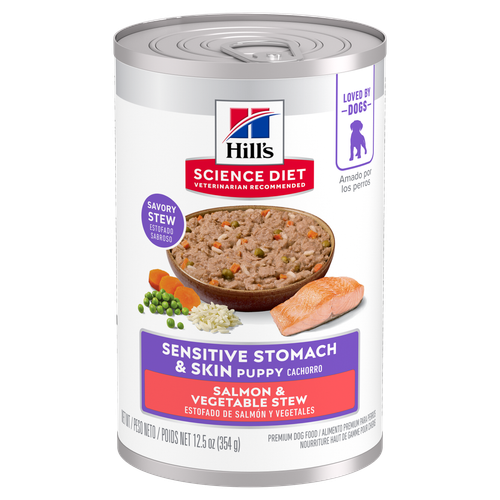
-
Find the right food for your petTake this quiz to see which food may be the best for your furry friend.Find the right food for your petTake this quiz to see which food may be the best for your furry friend.Featured products
 Sensitive Stomach & Skin, assortiment de conserves
Sensitive Stomach & Skin, assortiment de conservesHill's Science Diet Sensitive Stomach & Skin Variety Pack
Shop Now Adult Perfect Weight & Joint Support Hearty Vegetables and Tuna Stew Dog FoodShop Now
Adult Perfect Weight & Joint Support Hearty Vegetables and Tuna Stew Dog FoodShop Now Healthy Cuisine, Adulte, assortiment de conserves
Healthy Cuisine, Adulte, assortiment de conservesHill's Science Diet Healthy Cuisine Variety Pack
Shop NowFeatured products Kitten Sensitive Stomach & Skin Salmon & Vegetable Stew
Kitten Sensitive Stomach & Skin Salmon & Vegetable StewSupports kitten growth, digestive health, nourishes skin and promotes a lustrous fur
Shop Now Adult Indoor Salmon & Vegetable Medley Cat Food
Adult Indoor Salmon & Vegetable Medley Cat FoodPrecisely balanced nutrition for indoor cats with the delicious taste of savory salmon and vegetables
Shop Now Adult Urinary Hairball Control Savory Chicken Entrée cat food
Adult Urinary Hairball Control Savory Chicken Entrée cat foodSupports the health of the whole urinary system with optimal levels of magnesium
Shop Now -
Dog
- Dog Tips & Articles
-
Health Category
- Weight
- Food & Environmental Sensitivities
- Urinary
- Digestive
- Joint
- Kidney
- Dental
- Cancer
-
Life Stage
- Puppy Nutrition
- Adult Nutrition
- Senior Nutrition
Cat- Cat Tips & Articles
-
Health Category
- Weight
- Skin & Food Sensitivities
- Urinary
- Digestive
- Kidney
- Dental
- Stress
- Cancer
-
Life Stage
- Kitten Nutrition
- Adult Nutrition
Featured articles Pet Food Storage Tips
Pet Food Storage TipsDiscover how and where to store your dry, as well as canned, dog and cat food. Learn how to find the "best before" dates on all Hill's pet food packaging.
Read More The Incredible Science Behind Your Pet's Microbiome
The Incredible Science Behind Your Pet's MicrobiomeLearn what a pet's microbiome is, how it contributes to your pet's gut & overall health, and why nutrition is important in maintaining healthy microbiomes.
Read More Compare Your Pet Food's Calories to Other Brands
Compare Your Pet Food's Calories to Other BrandsCompare Hill's Science Diet dog and cat food's calories against other pet food brands and AAFCO recommended maximum calorie count.
Read More -


A common question among pet parents is why small dogs live longer than big dogs? In reality, does size really matter when it comes to the average lifespan of a dog? The short answer to this question is yes, dog size does affect lifespan. But is there anything that pet parents can do to help their dog — no matter their size or breed — to live a longer and happier life? Let's find out!
Why Do Small Dogs Live Longer?
One thing to keep in mind when talking about the average lifespans of small, medium, large and giant breed dogs is that these are average figures. This means that some dogs will live shorter than the average and other dogs will live longer. But if this is the case, why do small dogs live longer than large dogs?
It is believed that large dogs simply age more quickly than small dogs. It's not uncommon for some giant breeds to gain upward of 100 pounds (45.36 kilograms) in a year, whereas some small breeds may only gain 10 pounds (4.54 kilograms). This rapid growth associated with some giant breeds appears to negatively affect their longevity. When looking at the average lifespans of dogs based on breed, there are often certain generalizations; however, even within the same size category, some dogs may live longer than others due to common health issues associated with a specific breed.

What Is the Average Lifespan of a Dog?
The average lifespan of a dog is dependent on whether they're a small, medium, large or giant dog breed — so the answer varies.
Small Breed Dogs
Smaller breeds, like the Chihuahua and Maltese, which are popular due to their portability, are considered on average to be less than 20 pounds (9.07 kilograms) and have an average life expectancy of 10 to 15 years. However, the oldest known Chihuahua on record, named Megabyte, passed away at 20 years and 265 days old.
Medium and Large Dog Breeds
Medium dog breeds, like many of the spaniel breeds, are approximately 20-50 pounds (9.07-22.68 kilograms) and large breeds, like the popular Labrador retriever and boxer, are usually considered on average to be greater than 50 pounds (22.68 kilograms). The average lifespan for medium and large breeds is approximately 10-13 years.
Giant Dog Breeds
Giant dog breeds are usually considered to be greater than 90 pounds (40.82 kilograms). The average lifespan for a giant breed, such as the regal Great Dane, is unfortunately only 6-8 years, but some have lived to be 11-12 years old or older.
Further, mixed-breed dogs tend to live about 1.2 years longer on average than same-sized purebred dogs.
The current record for the longest-living dog based on Guinness World Records is held by a medium breed dog born in Australia in 1910, an Australian cattle dog named Bluey, who lived for 29 years and 5 months.


Tasty Tips
How Can Pet Parents Help Their Dogs Live Longer?
There are many things that pet parents can do to help their companion live a longer life, no matter what size or breed they have. The following can keep your pet happy and healthy:
- Provide routine wellness veterinary care: This includes regular physical examinations, appropriate vaccinations and other preventative health care measures, including heartworm and flea/tick preventatives, routine dental cleanings and blood work monitoring, as directed by a veterinarian. This routine care can help any dog live a longer life.
 Spay and neuter: Dogs of any size or breed can benefit from spaying or neutering in order to live longer. It reduces the risk of certain reproductive cancers, prostate or uterine infections (which can be life-threatening) and potential traumas/injuries.
Spay and neuter: Dogs of any size or breed can benefit from spaying or neutering in order to live longer. It reduces the risk of certain reproductive cancers, prostate or uterine infections (which can be life-threatening) and potential traumas/injuries.- Maintain a healthy weight: Provide your furry friend with tons of daily exercise and feed them the appropriate amount of food. A recent study published in the Journal of Veterinary Internal Medicine showed that the lifespan of overweight dogs was shortened by up to 2.5 years compared to dogs at an appropriate weight. Maintaining an appropriate body weight places less stress on the joints and organ systems of the body.
Different breeds have certain health concerns that pet parents, along with their vet, should monitor. It's recommended that the pet parent learn about the characteristics and common health concerns of a particular breed or mixed-breed dog prior to adoption. This helps them to identify health concerns early on so that they can be addressed with the family's vet in a timely manner.
So, why do small dogs live longer? The short answer is that large dogs age more quickly than small dogs, but there's more to take into account. With routine vet care, exercise and lots of love, you can give your dog their best chance at living a longer, healthier life. And hopefully, with the continuing advances in veterinary care and nutrition, there will be a day in the future where we don't have to ask questions like "why do small dogs live longer than big dogs" anymore.


Jessica Seid is an emergency veterinarian practicing in the New England area. She is a graduate of the North Carolina State College of Veterinary Medicine and has been in the field for more than a decade. When she's not helping patients, she enjoys spending time with her husband, daughter and French bulldog.
Related products


Hill's Science Diet Healthy Cuisine Variety Pack

Hill's Science Diet Sensitive Stomach & Skin Variety Pack

Gentle on stomachs while nourishing skin & supporting development in growing puppies
Related articles

Discover fun and engaging games and other ways to help your dog exercise, keeping him happy and healthy.

Proper nutrition for your pregnant or nursing dog is vital to her and her puppy's health. Learn what you should do provide her with the proper nutrients.

Gather the following puppy supplies to prepare your family for all the fun (and commitment) that comes with being a dog parent.

Learn how to stop your dog from begging at the dinner table, and understand how it can help contribute to his health.

Put your dog on a diet without them knowing
Our low calorie formula helps you control your dog's weight. It's packed with high-quality protein for building lean muscles, and made with purposeful ingredients for a flavorful, nutritious meal. Clinically proven antioxidants, Vitamin C+E, help promote a healthy immune system.
Put your dog on a diet without them knowing
Our low calorie formula helps you control your dog's weight. It's packed with high-quality protein for building lean muscles, and made with purposeful ingredients for a flavorful, nutritious meal. Clinically proven antioxidants, Vitamin C+E, help promote a healthy immune system.

